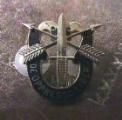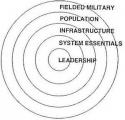Without forming a judgment as to whether he is right or wrong, the Best/Good options do not sound too dissimilar to the approach advocated by Rupert Smith in the Utility of Force, who said...
Smith, R. The Utility of Force, Penguin, London, 2006, p401The supporting arms and services must be kept to minimum so as to present the fewest targets...I think we must conceive of the application of force, in contrast to the intelligence and information operation, as a raid at theatre or strategic level rather than a sustained operation

















Bookmarks